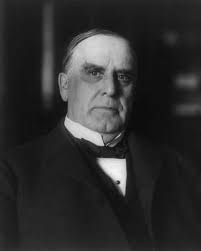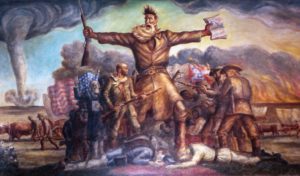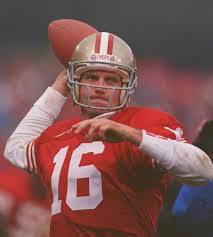JANUARY 29 — 1761 Happy Birthday politician and ethnologist Albert Gallatin; 1861 Bleeding Kansas enters Union; 1993 Eiffel Tower in Paris, TN becomes a historic landmark
JANUARY 29

1843 William “Wobbly Willie” McKinley, #25. McKinley was born in Niles, Ohio in 1843 and as a youngster wanted to be a Methodist minister when he grew up. He attended Allegheny College, then became a teacher at age 18 when the Civil War broke out. McKinley enlisted as a private in the Union Army, serving under future president and friend Rutherford B. Hays. By the end of the war he was promoted brevet major of volunteers. He studied law, opened his own law practice in Canton OH, and married Ida Saxton, the daughter of a local banker. The two had two daughters, but they both died early in their marriage, along with Ida’s mother, all within a few short months of each other.
The devastating losses became too much for Ida, and her health deteriorated to the point to where she would live the rest of her life as an invalid. McKinley won a seat in Congress at age 34, and spent 14 years serving in the House of Representatives. During his tenure in the House, William “The Idol of Ohio” McKinley became the leading Republican tariff expert, imposing high taxes on imported goods in order to support American manufacturers from foreign competition. He was the principle sponsor of the McKinley tariff of 1890, then was elected governor of Ohio where he served two terms. By 1898 the Democrats were being blamed for a devastating economic depression, and McKinley saw this as his chance to run for president for the Republican party.
He was the first president to use campaign buttons and the telephone to solicit votes. Legend has it, he refused to leave Ida for long campaign tours, due to her epileptic seizures so he arranged to have thousands of voters travel to his house in Canton, where he gave speeches on his front porch. In these speeches he backed the gold standard, while his Democratic opponent William Jennings Bryan promoted a gold and silver standard. His chief supporter, industrialist Marcus Alanzo Hanna, who was a powerful figure in the Republican party, organized McKinley’s campaign, and Wobbly Willie easily defeated Bryan for the 1896 election.
McKinley’s first action as president was raising customs duties, calling Congress into a special session to enact the Dingley Tariff, which was the highest tariff in history to that point. By 1893, the depression had nearly run its course and with it, the issue with silver. But it was his foreign policy that dominated William “Liberator of Cuba” McKinley’s first term. Spanish forces were trying to stop a revolution in Cuba. Yellow journalism from newspapers, namely the Hearst, screamed that a quarter of Cuba’s population had been killed and the rest of the country was suffering tremendously. But when The Human Iceberg McKinley dragged his feet on sending troops, Assistant to the Navy Teddy Roosevelt called him a white-livered cur, and that McKinley had no more backbone than a chocolate éclair.
Public resentment brought pressure upon President Ohio Napoleon McKinley to go to war, and the Spanish-American War was declared in April 1898 after the Spanish was unjustly and incorrectly accused of sinking U.S. battleship The Maine outside of Havana’s harbor. This would be America’s first war with a European country since the War of 1812, and it lasted 100 days. The United States destroyed the Spanish fleet near the Santiago harbor in Cuba, seized Manila in the Philippines, and occupied Puerto Rico. The Treaty of Paris ended this war in December 1898, but when McKinley toured Cuba he noticed an imperialist sentiment from the people, so he decided to annex the Philippines, Guam and Puerto Rico.
In other foreign policies, the Ohio Napolean McKinley sent troops to China to deal with the Boxer Rebellion, an uprising against foreign intervention in China, thus protecting American interests in world markets. Meanwhile, back at the White House, Wobbly Willi liked to wear a white vest and a lucky red carnation in his buttonhole, refused to be photographed unless he was properly groomed, and was the first president to appear on film, thanks to Thomas Edison’s new invention.
In the presidential election of 1900, the Idol of Ohio McKinley ran with Teddy Roosevelt on the vice-president ticket, against William Bryan again, who ran on an anti-imperialist platform. Americans loved McKinley, not just because of his success in the Spanish-American War, and not just because his domestic policies got America out of a depression. Americans also loved him for his unwavering dedication to First Lady Ida, who still suffered from seizures. McKinley beat Bryan again, this time by an even wider margin than the first.
Beginning his second term, he toured the country and gave speeches to favorable crowds, until September 5, 1901, in Buffalo New York. After giving a speech in front of 50,000 people at the Pan-American Exposition, a deranged anarchist fired two shots into the president’s chest and abdomen. He warned his personal secretary George Cortelyou, “My wife, be careful Cortelyou, how you tell her. Oh, be careful.” Williams McKinley would die from his wounds eight days later, and Vice President Theodore Roosevelt subsequently took office. “For labor a short day is better than a short dollar.” “The ideals of yesterday are the truths of today.” Happy birthday William!
Jan 29 1761 happy birthday Swiss-American speaker Albert Gallatin!
America’s father of ethnology, which I’ll get to in a moment or two.
Born in Geneva, Gallatin moved to America in the 1780s, winding up in Pennsylvania. Known for being a true diplomat, he was sent to try and calm tempers during the Whiskey Rebellion, where a tax on whiskey got farmers in western Pennsylvania all would up and creating an uprising. During the summer of 1792, Gallatin met some of these insurgents near Pittsburgh, who 0 wound up on a list of people President George Washington wanted arrested.
In an alternate universe, according to L. Neal Smith in The Probability Broach, as part of his North American Confederacy series, Gallatin actually joined, and led the farmers insurgency, held Washington guilty for treason, executed him, and made Gallatin the second president of the US until the year 1812. Back on earth, however, as an anti-Hamiltonian, Gallatin became a stout speaker for the Democratic-Republican party, and in 1795 became a member of the House of Representatives, where he would serve for what would become the Ways and Means Committee, and then was elected America’s fourth Secretary of the Treasury, serving the longest tenure yet from Presidents Thomas Jefferson and James Madison from 1801-1814.
So what did he do all those years in charge of the American money system? He opposed Alexander Hamilton’s views and, depending on who you ask, lowered the national debt $23M, even with the $15M Louisiana Purchase. Completely opposed to the War of 1812, I mean, for one thing, so much for bringing down all that debt, right?,
Gallatin would nonetheless sail to Europe and serve a huge role in settling matters in long mind-numbing discussions between US delegates Henry Clay and John Quincy Adams, and delegates from the UK during the Treaty of Ghent in August 1814.
Staying put, he would serve as United States minister to France until 1823, and then came home to Pennsylvania. For the election of 1824, he was thrusted into the campaign under William Crawford, who would oppose Andrew Jackson, JQA, and Henry Clay. It did not help Gallatin’s career as he would have to withdraw due to lack of popular support. After serving US Minister to the UK, from 1826-27, he retired and moved to New York where he became founder of the New York University in 1931 and the Gallatin bank of New York. I mentioned in the beginning he’s the father of ethology here in the US, or the study of linguistic characteristics between north and south indigenous American natives.
Towards the last few years of his life, Alfred Gallatin personally talked with Lewis Cass, William Clarke, Thomas McKinney from the Bureau of Indian Affairs, as well as Cherokee tribal leader John Ridge, and in 1826 wrote and published A Table of Indian Languages of the United States, and Synopsis of the Indian Tribes of North America in 1836. Albert Gallatin, who originally emigrated to the United States and served on the 1789 constitutional convention in Philly, the oldest member of Thomas Jefferson’s cabinet, passed away on August 12, 1849, in what is now Queens, New York, at age 88. A diplomat, a speaker, American father of ethnology, depending on who you ask.
Happy birthday Albert!

1861 – Bleeding Kansas enters the Union. In 1854 when Kansas and Nebraska were setup as territories, Nebraska didn’t want slavery an Kansas did. There was violence on both sides, John Brown led a group of anti-slavery to Kansas to raid Harpers Ferry and pro-slavery groups invaded the town of Lawrence during the middle of the Civil War, killed 200 men and burned the
1979 16 year old Brenda Spencer starts a really ugly trend by going on a school shooting spree, killing two and injuring nine. Because she hated Mondays’. She’s still serving time in a California prison, and the shooting inspired the famous Boomtown Rats song I Don’t Like Mondays.
2001 — Super Bowl XXXV won by Ravens over Giants 34-7 – Giants had 5 turnovers
1996 — Super Bowl XXX won by Dallas over Pittsburgh 27-17 – Larry Brown MVP – had 2 interceptions

1990 — Super Bowl XXIV won by 49ers as they beat Denver 55-10 – Joe Montana MVP – 297 yards passing and 5 TDs – 3 to Jerry Rice who had 148 yards receiving
